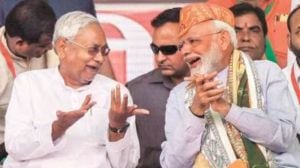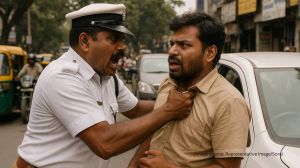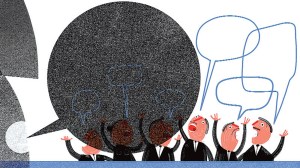RJD chief, Fazlur rescue dead meet
In the vast Crystal Ball Room of the Islamabad Marriott, it is clear that Indo-Pak speak has become wearying and full of cliches.Two giganti...

In the vast Crystal Ball Room of the Islamabad Marriott, it is clear that Indo-Pak speak has become wearying and full of cliches.
Two gigantic delegations of Indian and Pakistani MPs confront each other on the first day of the South Asian Free Media Association conference to listen to Margaret Alva droning on about the Nehruvian vision. Sherry Rahman of the PPP asserts (again) that Kashmir is central to Pakistani sanity. Ram Vilas Paswan pleads India and Pakistani should unite like North and South Korea, failing to keep in mind that not only are North and South Korea not united but the last thing Pakistanis want to hear is they must merge their nation with India. Anadi Sahu of the BJP says predictable things about the need for peace. Javed Hashmi of the PML (N) launches a surprising and open attack on the military leadership of Pakistan. But none of this is enough to stave off the massive fatigue that settles on all the delegates.
Then two speakers rise to their feet, one after the other in quick succession, and the atmosphere becomes charged with electricity. On the first day of the MPs’ conference, Fazlur Rehman and Laloo Prasad Yadav rescued the Indo-Pak dialogue from plunging into an abyss of sheer boredom.
‘‘No third party mediation!’’ says Fazlur Rehman, in a passionate speech. ‘‘I am a son of the soil! India and Pakistan have a common enemy: hunger and thirst.’’ His eyes look as if they are full of tears, his fists shake as he roars out his love for the dying soldiers on the border — both Indian and Pakistani — and cries out for someone to save those young lives.
After landslide victories in NWFP and Baluchistan, the Jamiat-ul-ulema-i-Islam in particular and the MMA or Muttahida Majlis-e-Amal (MMA), a combination of six religious parties, are experiencing a political resurgence. The maulanas are increasingly taking activist positions on peace with India as well as restoration of the Pakistani Constitution.
Then comes the turn of Laloo. Laloo makes a stirring speech which sends the Pakistani delegates into paroxysms of claps and cheers. ‘‘There is no younger brother and older brother in India and Pakistan,’’ he says, ‘‘Koi chhota nahin hai, koi bada nahi hai. We are equal!’’ Bihar ke wazir-e-alam, exults writer Alia Imam as the Crystal Ball room resounds with claps.
Laloo continues: ‘‘If a bail (buffalo) is tied to a khunti (stick in the ground) and I call a panchayat over a dispute with my neighbour about the bail but I refuse to move the khunti, how will the dispute be solved? I must move the khunti.’’ He says India’s obsession with cross-border terrorism and Pakistan’s with Kashmir are roadblocks to Indo-Pak relations.
He offers the gathering the love and best wishes of his wife Rabri, ‘‘jo ki Bihar ke chief minister hai, and sits down to thunderous applause, cheers from the Pakistani press and and table-thumping from the MPs. ‘‘I feel’’, mutters Mani Shankar Aiyar, ‘‘like a starlet in a Laloo road show.’’ ‘‘Maulana Fazlur Rehman’’, says PML (N) MP Tariq Azeem, is the best speaker in Pakistan today. Today, for Indo-Pak dialogue to have any meaning, the thinking has not only to be original but delivered by personalities who are outside the liberal ghetto.



- 01
- 02
- 03
- 04
- 05




























